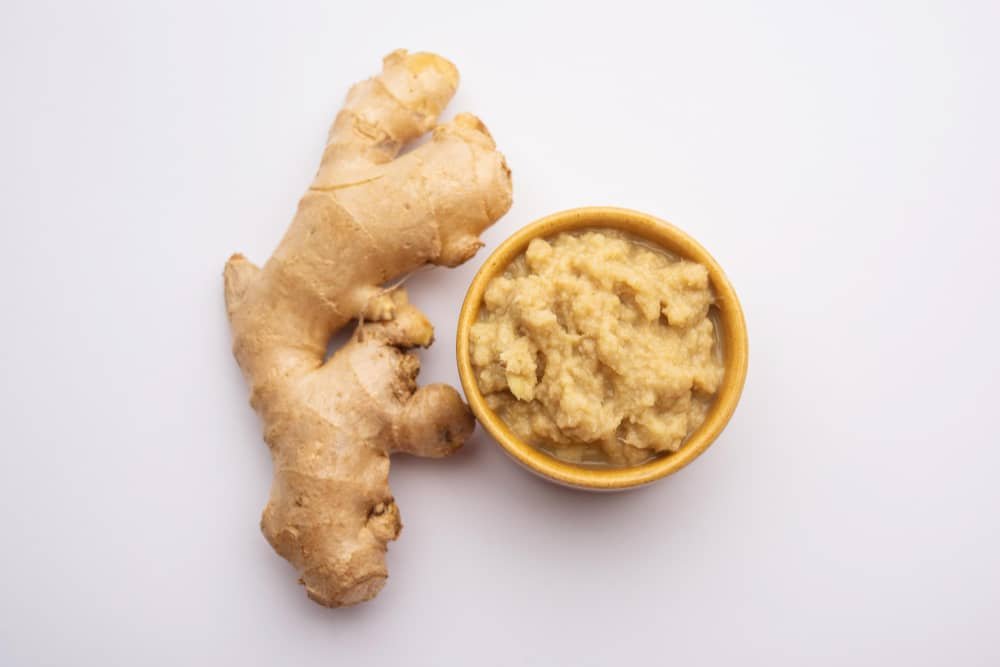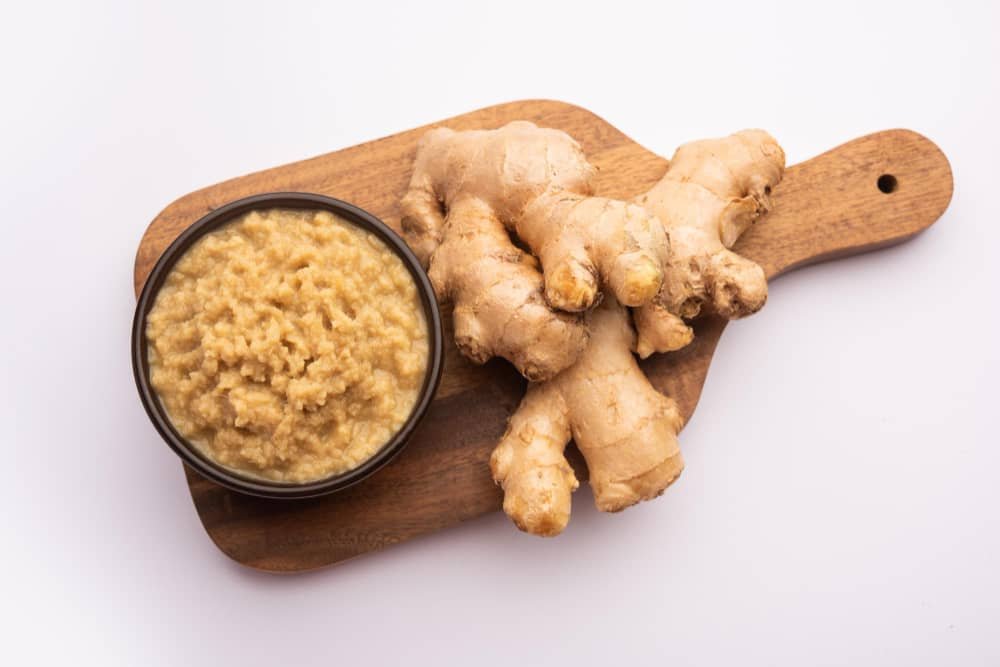Affiliate Disclosure: As an Amazon Associate, we may earn commissions from qualifying purchases from Amazon.com. You can learn more about our affiliate policie
Discover the amazing health benefits of ginger tea! Learn why drinking ginger tea can help improve digestion, reduce inflammation, and boost your immune system.
Ginger tea is beloved worldwide for its unique flavor, but did you know it’s also packed with a range of health benefits? From its antioxidant properties to its ability to reduce inflammation and improve digestion, ginger tea is an excellent addition to any diet if brewed correctly.
In this article, we’ll explore what makes ginger tea so beneficial, including its vitamin and mineral contents and the lesser-known health benefits associated with its consumption. So dive in and discover the powerful benefits of drinking ginger tea!
What Is Ginger?
Ginger is a popular herb from the Zingiberaceae family, native to India and Southeast Asia. It is often used as a spice and flavoring agent but has many healing properties. Ginger is a rhizome, consisting of a root system that grows underground and sends out shoots above the surface. It is a perennial plant, meaning it will regrow after its root system is harvested.
Ginger is known for its intense and spicy flavor and its health benefits. It has been used in traditional medicine for centuries and is renowned for its anti-inflammatory, antioxidant, and anti-nausea properties. The active ingredient in ginger is gingerol, a compound found in the plant’s root. This compound is believed to be responsible for many of its medicinal properties.
The health benefits of ginger tea are numerous. Gingerol has been found to help reduce inflammation, decrease muscle pain, and improve gastrointestinal symptoms. In addition, ginger may help boost the immune system and protect against infections. Studies have also shown that ginger may help lower blood pressure and cholesterol and improve blood glucose levels in people with diabetes. Ginger tea can also help reduce feelings of nausea and morning sickness, as well as aid digestion. Finally, drinking ginger tea may help promote relaxation and reduce anxiety.
Overall, ginger tea can be an excellent way to reap the many health benefits of this amazing herb. Not only does it provide a delicious flavor, but it can also help boost your overall wellbeing.

Nutritional Benefits of Ginger
Ginger tea is an herbal tea made from the rhizome of the ginger plant, which belongs to the Zingiberaceae family. It has been used for centuries in traditional medicine and to treat various health issues due to its wealth of vitamins, minerals, and antioxidants. Ginger tea is known for its anti-inflammatory, antioxidant, and antiemetic qualities, making it a popular choice for those seeking to improve their health.
Nutritionally, ginger tea is packed with essential vitamins and minerals, making it an important and nutritious addition to any diet. For example, ginger tea is a good source of Vitamin A, a fat-soluble vitamin that helps keep the skin and eyes healthy. It is also a good source of Vitamin C, which allows the body to fight infection, reduces inflammation, and supports healthy skin and collagen production. Additionally, ginger tea is a good source of calcium and magnesium, essential for bone health and proper muscle function.
Ginger tea has been historically used to treat nausea and morning sickness. A 2016 study found that ginger tea effectively reduced nausea and vomiting symptoms in pregnant women. In addition, research suggests that ginger tea may have other benefits for gastrointestinal health, as it can help reduce pain, bloating, and gas. Ginger tea may also help fight colds and flu, as it can help reduce the severity of symptoms.
Ultimately, ginger tea can be highly beneficial when aiming to lose weight. With its low-calorie properties and ability to enhance metabolism, ginger tea aids in calorie burning and shedding excess pounds. Moreover, studies have indicated that incorporating ginger tea into one’s daily routine can effectively reduce body fat mass and waist measurements.
Ginger tea is a healthy and nutritious choice for those looking to improve their health. With its various vitamins, minerals, and antioxidants, ginger tea can help reduce inflammation, boost immune health, and aid in weight loss. Whether you want to improve your digestive health, reduce nausea, or need a refreshing and invigorating herbal tea, ginger tea can be a great choice.
Vitamin and Mineral Contents
Ginger tea is a popular hot beverage that has numerous health benefits. One of the reasons for these benefits is that it is rich in many essential vitamins and minerals. Ginger tea contains many vitamins A, C, B6, and E and other essential minerals, such as magnesium, potassium, and iron.
Vitamin A is an essential nutrient that plays a vital role in vision, growth, and development. It also helps to protect against certain diseases and helps to maintain healthy skin. Vitamin C is a powerful antioxidant that helps to protect cells from damage caused by free radicals. It also aids in the absorption of iron and aids in wound healing. Vitamin B6 is essential for metabolism, as well as helping to regulate hormones. Vitamin E is a fat-soluble vitamin that plays a role in protecting against free radicals and helps to maintain healthy skin and immunity.
Ginger tea is rich in minerals that are important for human health. Magnesium is essential for muscle and nerve function, as well as for healthy bones and teeth. Potassium helps regulate blood pressure and heart rate and is crucial for muscle and nerve function. Iron is necessary for transporting oxygen throughout the body and is also essential for producing red blood cells.
The combination of vitamins and minerals in ginger tea makes it a very beneficial beverage for those looking to improve their health. Drinking ginger tea regularly can help to boost the immune system, increase energy levels, and promote better digestion. With so many benefits, it is easy to see why ginger tea has become such a popular beverage.

Antioxidant Effects
Ginger tea has many health benefits due to its powerful antioxidant properties. Antioxidants are compounds that help protect cells from damage caused by free radicals, which are molecules that can damage cells and contribute to the aging process. Studies have shown ginger tea is rich in antioxidants, including gingerol, the main active component in ginger root. Additionally, ginger tea is a good source of other antioxidants, such as quercetin and kaempferol, as well as vitamins and minerals, such as vitamin C, magnesium, and zinc.
The antioxidants in ginger tea can help protect cells from oxidative damage and reduce inflammation, which is linked to many chronic diseases. Studies have found that ginger tea can help to protect against the damage caused by oxidative stress, which is the imbalance between the production of reactive oxygen species and neutralization through antioxidants. Additionally, research has shown that ginger tea can help to reduce inflammation and protect against tissue damage caused by inflammation.
Overall, ginger tea is an excellent source of antioxidants and can help to protect cells from oxidative damage and reduce inflammation. This can positively impact overall health and wellbeing and help reduce the risk of many chronic diseases.
Health Benefits of Ginger Tea
Ginger tea is a popular beverage enjoyed by many. It has been used as a traditional remedy for centuries in cultures worldwide, and modern science has revealed many health benefits associated with drinking ginger tea. Studies have shown that regular consumption of this tea can help improve digestive health, reduce inflammation, and even fight off illnesses. Here, we’ll discuss some of ginger tea’s most prominent health benefits.
One of ginger tea’s most widely acknowledged health benefits is its ability to reduce inflammation. In particular, ginger tea can effectively reduce inflammation associated with digestive problems, such as irritable bowel syndrome (IBS). It also contains certain compounds, such as gingerols, that can reduce inflammation. On top of this, ginger tea can help prevent the growth of bacteria and viruses, which can contribute to further inflammation.
Ginger tea is also known to improve digestive health. It helps to soothe the stomach and reduce symptoms associated with nausea and indigestion. It can also help to enhance the absorption of nutrients, which can lead to better overall health. Furthermore, research suggests that ginger tea consumption can reduce symptoms of bloating and gas, aiding in a smoother digestive experience.
Ginger tea has also been found to help reduce the risk of certain illnesses, such as the common cold. This is because it contains compounds that can help to fight off viruses and bacteria. Additionally, research has shown that drinking ginger tea can help to improve the body’s immunity, allowing it to fight off illnesses better.
Overall, ginger tea is a popular beverage with many potential health benefits. Regularly consuming this tea can help with digestive issues, reduce inflammation, and improve overall health. If you are looking for a way to improve your health, ginger tea is worth considering.

Relieves Digestive Issues
Ginger tea is one of the most popular herbal teas in the world, known for its health benefits and delicious flavor. One of the main advantages of ginger tea is its ability to help with digestion. Ginger tea can alleviate nausea, indigestion, and upset stomach.
Ginger tea has anti-inflammatory properties, which are thought to be beneficial for digestive disorders like irritable bowel syndrome (IBS) and ulcers. In addition, ginger tea can help reduce bloating, gas, and other symptoms of indigestion. It may also reduce pain associated with digestive issues.
Ginger tea also contains antioxidants that can help reduce oxidative stress, which contributes to the development of different diseases, including digestive issues. In addition, the antioxidants can combat inflammation, which further helps with digestive problems.
Ginger tea may also help stimulate digestion. Due to its natural properties, some ginger tea can act as a mild laxative and help ease constipation. It is thought that tea can help stimulate the digestive juices in the stomach and may also help with food absorption.
Overall, ginger tea can be a highly beneficial drink for those suffering from digestive issues. Its natural anti-inflammatory and antioxidant properties, as well as its ability to stimulate digestion, can make it a helpful remedy. To get the most benefit from the tea, drink it on an empty stomach or before a meal.
Reduces Nausea
Ginger tea is a hot beverage used for centuries as a remedy for various ailments. Studies have shown that it can help relieve nausea, a common symptom of many health conditions. The active compounds gingerol, shogaol, and paradol work together to reduce nausea and other digestive issues.
Ginger tea is effective in reducing the symptoms of motion sickness, morning sickness, chemotherapy-induced nausea, and seasickness. A study conducted in 2020 showed that consuming ginger tea before chemotherapy treatments resulted in significantly lower nausea ratings compared to those who did not drink ginger tea. The same study also found that ginger tea better relieved nausea than antiemetic drugs, such as ondansetron.
Ginger tea can also be beneficial for those suffering from morning sickness. A review of eleven studies found that consuming ginger tea significantly reduced the symptoms of morning sickness, leading to a notable decrease in nausea and vomiting. For those suffering from morning sickness, drinking ginger tea can be a safe and effective way to reduce nausea without using pharmaceuticals.
Not only is ginger tea an effective way to reduce nausea, but it is also an incredibly delicious and soothing beverage. When brewed, it has a spicy-sweet taste and a pleasant aroma. It can be enjoyed as is but can also be sweetened with honey or other natural sweeteners for added flavor.
Ginger tea is one of the oldest and most reliable remedies for nausea. It can reduce the symptoms of motion sickness, morning sickness, chemotherapy-induced nausea, and seasickness. Not only is it effective in relieving nausea, but it is also a delicious and soothing beverage everyone can enjoy.
Promotes Weight Loss
Ginger tea is an increasingly popular beverage that has been found to have numerous health benefits. One of the significant benefits is its ability to promote weight loss. Drinking ginger tea regularly has been shown to improve metabolism, reduce food cravings, and increase fat burning, which can help in weight-loss. Additionally, ginger tea has been found to reduce appetite and increase satiety, meaning you feel fuller for longer and are less likely to snack between meals. Studies have also shown that ginger tea has thermogenic properties that can help boost your metabolism, enabling you to burn more calories throughout the day.
In addition to helping with weight loss, ginger tea has other health benefits. This beverage boosts immunity, improves digestion, reduces inflammation, reduces nausea, and alleviates pain. Not only is ginger tea a refreshing and delicious drink, but it’s also beneficial for your overall health.
You can steep fresh ginger slices or grated ginger in hot water and strain to make ginger tea. Alternatively, you can purchase ginger tea bags from the store that have already been brewed. You can also add other ingredients, like lemon or honey, to the drink for added flavor.
Ginger tea is a delicious and healthful way to maintain weight and improve overall health. With its ability to boost metabolism, reduce appetite and cravings, and increase satiety, it’s no wonder that ginger tea is becoming a popular beverage for many health-conscious individuals.

Decreases Risk of Infection
One of the significant health benefits of drinking ginger tea is that it can help reduce the risk of infection. Studies have shown ginger has strong antibacterial, antiviral, and antifungal properties, which can help protect the body from different conditions. For example, ginger tea effectively treats skin diseases and infections, such as ringworm and athlete’s foot, when applied topically.
Additionally, drinking ginger tea regularly can help bolster the immune system, making it more effective in fighting cold and flu-like illnesses. Drinking ginger tea may also help reduce the risk of respiratory infection, as its active ingredients can help improve lung function and reduce inflammation. Drinking ginger tea regularly is a great way to protect the body from harmful conditions and keep the immune system strong and healthy.
Helps Regulate Blood Sugar Levels
Ginger tea has been used medicinally for centuries and is gaining popularity as a natural remedy for several ailments. One of the primary benefits of ginger tea is its ability to help regulate blood sugar levels. Studies have shown ginger can help lower blood sugar levels in diabetic and pre-diabetic people. It works by stimulating insulin secretion, as well as helping to reduce the absorption of glucose in the intestines.
There are several ways to make ginger tea, including adding fresh or ground ginger root to hot water or steeping ginger in already brewed tea. Studies suggest consuming two to four grams of fresh or dried ginger root may help regulate blood sugar levels. It is important to note that the amount of ginger root consumed may vary depending on the degree of glucose intolerance or diabetes. It is best to consult a doctor or certified nutritionist before taking ginger tea to regulate blood sugar levels.
Ginger tea also offers a variety of other benefits. It can reduce inflammation, help relieve pain, and ease digestive issues. Additionally, ginger tea may benefit those trying to lose weight, as it has been shown to increase metabolism and suppress appetite.
In conclusion, ginger tea is an effective natural remedy for blood sugar regulation and several other health benefits. It is important to note that ginger should be consumed in moderation, as drinking too much may cause a variety of side effects. Consult a professional health provider before taking ginger tea to regulate blood sugar levels.
Conclusion
In conclusion, ginger tea is one of the most beneficial beverages available due to its numerous health benefits. Packed with vitamins and minerals and rich in antioxidants, ginger tea offers many potential health benefits. These include relieving digestive issues, reducing nausea, promoting weight loss, decreasing infection risk, and helping regulate blood sugar levels. Therefore, it is essential to have ginger tea in your diet for optimal health and wellness. Whether you make your own or buy it pre-packaged, ginger tea is an excellent choice for its taste and health benefits.







